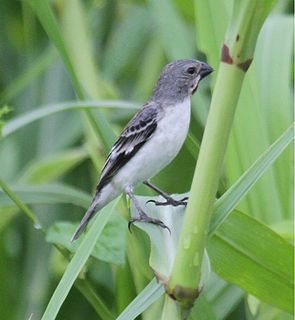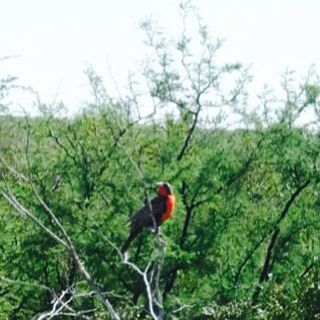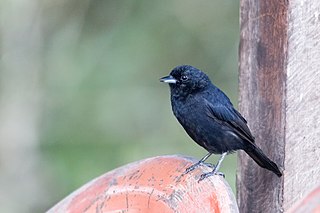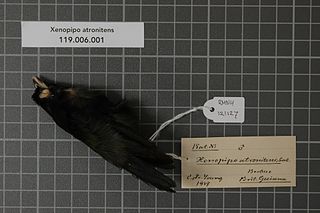
The red-breasted meadowlark is a passerine bird in the New World family Icteridae. It was formerly named red-breasted blackbird but is not closely related to the red-winged blackbird group.

Meadowlarks are New World grassland birds belonging to genera Sturnella and Leistes.

The white-browed meadowlark is a passerine bird in the New World family Icteridae. It was formerly named white-browed blackbird but is not closely related to the red-winged blackbird group.

The oasis hummingbird is a species of hummingbird in the family Trochilidae. It is found in coastal regions of Peru in a 100–200 km wide strip that extends the length of Peru's coastline, about 3000 km. It is also found in an adjacent population in Chile; a second disjunct population in coastal Chile exists 2000 km to the south, in a 75 by 200 km coastal strip.

The long-tailed meadowlark is a passerine bird of southern South America and the Falkland Islands, belonging to the meadowlark genus Leistes in the icterid family that looks very similar to the related endangered species, the Pampas meadowlark.

The red pileated finch, also known as the red-crested finch, is a species of bird in the family Thraupidae. It is found in Argentina, Bolivia, Brazil, Ecuador, French Guiana, Guyana, Paraguay, Peru, on the eastern side of the Andes. Its natural habitats are subtropical or tropical dry forests, subtropical or tropical moist lowland forests, subtropical or tropical dry shrubland, and heavily degraded former forest. This is a common species, and the International Union for Conservation of Nature has rated its conservation status as "least concern".

The epaulet oriole is a species of bird in the family Icteridae. The moriche oriole, formerly considered a distinct species is now placed herein as a subspecies. The variable oriole,, was formerly considered conspecific, but has recently been split by the SACC.

The ant-eating chat or southern anteater-chat is a species of bird in the family Muscicapidae. It is found in Botswana, Eswatini, Lesotho, Namibia, South Africa, and Zimbabwe. Its natural habitats are subtropical or tropical dry shrubland and subtropical or tropical dry lowland grassland.

The collared warbling finch is a species of bird in the family Thraupidae. It is found in Ecuador and Peru.

Lesson's seedeater is a bird species in the family Thraupidae.

The double-collared seedeater is a species of bird in the family Thraupidae.

The black-and-white seedeater is a species of bird in the family Thraupidae. It is found in Bolivia, Brazil, Colombia, Ecuador, Peru, and Venezuela. Its natural habitats are subtropical or tropical moist shrubland, subtropical or tropical high-altitude shrubland, and heavily degraded former forest.

The drab seedeater is a species of bird in the family Thraupidae. It is found in Ecuador and Peru. Its natural habitats are subtropical or tropical dry shrubland, subtropical or tropical moist shrubland, and subtropical or tropical high-altitude shrubland.

The chestnut-throated seedeater is Neotropical songbird in the family Thraupidae.

The Pampas meadowlark is a species of bird in the family Icteridae. It is found in Argentina, Brazil, and Uruguay.

The Marañón spinetail is a species of bird in the family Furnariidae. It is found in Ecuador and Peru. Its natural habitats are subtropical or tropical dry forests, subtropical or tropical moist lowland forests, and subtropical or tropical dry shrubland. It is threatened by habitat loss.

The red-shouldered tanager is a species of bird in the family Thraupidae.

The black manakin is a species of bird in the family Pipridae. It is found in Bolivia, Brazil, Colombia, French Guiana, Guyana, Peru, Suriname, and Venezuela.

The striped woodcreeper is a species of bird in the woodcreeper subfamily (Dendrocolaptinae). It is found in Bolivia, Brazil, Colombia, Ecuador, French Guiana, Guyana, Peru, Suriname, and Venezuela. Its natural habitats are subtropical or tropical moist lowland forests, subtropical or tropical swamps, and subtropical or tropical dry shrubland.

The white-fronted woodpecker is a species of bird in the family Picidae. It is found mainly in Bolivia, Paraguay and Argentina. Its natural habitats are subtropical or tropical dry forests, subtropical or tropical dry shrubland, and subtropical or tropical high-altitude shrubland.






















